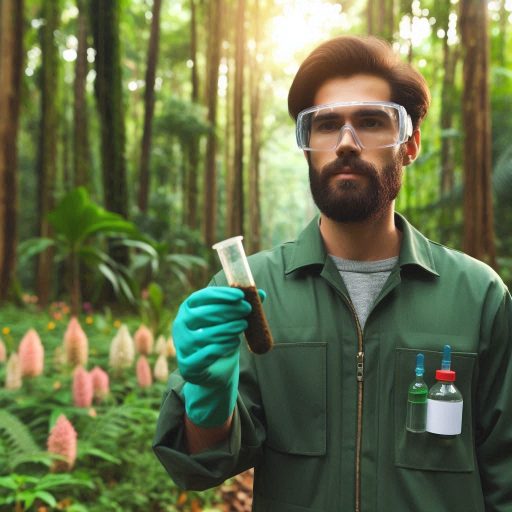Introduction
Environmental technician certification is crucial for validating expertise and enhancing career prospects in the field.
Certification demonstrates a technician’s knowledge and skills in environmental monitoring and protection.
It provides a benchmark for professional competence and ensures adherence to industry standards and regulations.
Environmental technicians play a vital role in safeguarding our environment.
They monitor air, water, and soil quality to detect pollutants and assess environmental impact.
By analyzing data and conducting tests, they help prevent environmental degradation and promote sustainable practices.
Their work supports industries, government agencies, and communities in making informed decisions about environmental protection.
Becoming a certified environmental technician offers numerous benefits.
Certification enhances job credibility and can open doors to advanced career opportunities.
It often leads to higher earning potential and increased job security.
Certified technicians gain access to a network of professionals and resources that support their ongoing development.
Additionally, certification often requires continuing education, keeping technicians updated on the latest technologies and regulations.
This ongoing learning helps them stay competitive in the field and adapt to evolving environmental challenges.
Overall, certification not only validates a technician’s skills but also strengthens their commitment to protecting the environment.
It represents a significant step in professional growth and contributes to the broader goal of environmental stewardship.
Research and Understand the Certification Requirements
Researching Environmental Technician Certifications
To ace environmental technician certification, start by researching the available certifications.
Different certifications cater to various specializations within the field.
For instance, some focus on hazardous materials, while others emphasize water quality or soil analysis.
Investigate which certifications align with your career goals and interests.
Look into certification bodies such as the National Institute for Certification in Engineering Technologies (NICET) or the Board of Certified Safety Professionals (BCSP).
Each organization offers specific certifications that can enhance your expertise and marketability.
Understanding the scope and focus of each certification will guide your preparation efforts.
Understanding Certification Requirements
Each certification program has unique requirements and prerequisites.
For instance, some certifications require a certain number of work experience hours.
Others might demand completion of specific coursework or training programs.
Review each certification‘s criteria carefully to ensure you meet all requirements.
Some certifications may also have exams or practical assessments.
Familiarize yourself with these requirements to avoid surprises during the application process.
Knowing what is expected helps you prepare effectively and increases your chances of success.
Each certification program provides detailed information about its requirements on its official website or in its candidate handbook.
Familiarizing Yourself with the Application Process
The application process for environmental technician certifications varies by program.
Start by gathering all necessary documents and information.
This may include proof of education, work experience, or training.
Follow the instructions provided by the certification body closely.
Many programs require submitting an application form and paying a fee.
Some certifications also involve scheduling and preparing for an examination.
Be aware of important deadlines to avoid missing out on opportunities.
Certification bodies often have specific windows for application submissions and exam scheduling.
Keeping track of these dates ensures you complete the process smoothly and on time.
Meeting Application Deadlines
Deadlines are crucial when applying for environmental technician certifications.
Mark important dates on your calendar and set reminders to stay on track.
Certification bodies often have strict deadlines for application submissions and exam registrations.
Missing these deadlines can delay your certification or require reapplying in the future.
Plan ahead to ensure you have enough time to gather documents, complete coursework, and prepare for exams.
Timely submission of your application and supporting materials can prevent unnecessary stress.
Adhering to deadlines reflects your organizational skills and commitment to the certification process.
Read: Online Courses for Surveying and Mapping Technicians
Enroll in a Reputable Training Program
Finding Accredited Training Programs
To ace your environmental technician certification, first look for accredited training programs.
Accreditation ensures the program meets industry standards and provides high-quality instruction.
Accredited programs align with certification requirements, enhancing your preparation.
Verify the program‘s credentials through official certification bodies or educational institutions.
This guarantees that the training is both credible and relevant to your certification goals.
Choosing a Program That Covers Required Topics
Select a program that thoroughly covers the topics and skills required for the certification exam.
Review the course syllabus to ensure it includes core areas such as environmental regulations, sampling techniques, and data analysis.
A well-rounded curriculum should also address practical skills, such as equipment handling and safety procedures.
This comprehensive approach ensures you are well-prepared for all aspects of the certification test.
Additionally, seek programs with a focus on exam preparation.
Some courses offer practice tests and review sessions specifically designed to familiarize you with the exam format.
These resources can provide valuable insights into the types of questions you may encounter and help you identify areas needing further study.
Considering Online Courses or In-Person Classes
Decide whether an online course or in-person class suits your learning style and schedule.
Online courses offer flexibility, allowing you to study at your own pace and from any location.
They are ideal if you have a busy schedule or prefer to learn independently.
Many online programs also provide interactive elements, such as virtual labs and discussion forums, enhancing the learning experience.
On the other hand, in-person classes provide a structured environment with direct access to instructors.
They offer hands-on learning experiences and immediate feedback, which can be beneficial if you thrive in a classroom setting.
In-person classes also facilitate networking with peers and instructors, potentially leading to valuable professional connections.
Evaluate the pros and cons of each option based on your personal preferences and learning needs.
Consider factors such as your preferred study environment, schedule flexibility, and budget.
Both online and in-person options can be effective if they align with your learning style and certification goals.
To excel in your environmental technician certification, start by selecting an accredited training program.
Ensure the program covers all necessary topics and skills.
Choose between online or in-person classes based on your preferences and needs.
With careful consideration and preparation, you can successfully achieve your certification and advance your career.
Read: Surveying and Mapping Technician: Job Satisfaction
Gain Practical Experience
Seek Out Internships or Volunteer Opportunities
Securing internships or volunteer positions in the environmental field can significantly enhance your career prospects.
These opportunities offer practical experience that complements your certification.
Look for organizations or projects focused on environmental protection, conservation, or sustainability.
Internships and volunteer roles allow you to apply theoretical knowledge in real-world settings.
They also help you develop professional skills and build valuable networks.
Actively seek these opportunities through job boards, university programs, or environmental organizations.
Apply Knowledge from Training Programs
Applying knowledge from your training program in real-world scenarios is crucial for solidifying your skills.
Use the concepts and techniques learned during your certification training in practical situations.
This hands-on experience reinforces your understanding and demonstrates your competency.
Whether you’re working on field surveys, data collection, or environmental assessments, apply your training directly.
This practical application helps bridge the gap between theoretical learning and actual job requirements.
It also showcases your ability to perform effectively in various environmental contexts.
Build a Strong Foundation of Practical Experience
Building a strong foundation of practical experience is essential for supplementing your certification.
Engage in diverse projects and tasks to gain comprehensive experience.
Participate in activities such as site inspections, environmental impact assessments, or remediation projects.
This experience helps you understand the complexities of environmental work and enhances your problem-solving skills.
Practical experience also prepares you for unforeseen challenges and improves your adaptability.
Document your work and achievements to highlight your expertise and growth in the field.
Benefits of Hands-On Experience
Hands-on experience offers several benefits beyond theoretical knowledge.
It helps you develop a deeper understanding of environmental issues and solutions.
Working directly with professionals and real-world problems builds your confidence and competence.
Practical experience also makes you a more attractive candidate to employers.
It demonstrates your commitment and ability to apply learned concepts effectively.
Additionally, it provides insight into industry standards and practices, which can inform your career development and specialization choices.
Networking and Professional Growth
Internships and volunteer roles often provide networking opportunities with industry professionals.
Build relationships with mentors, colleagues, and industry leaders.
These connections can offer valuable guidance, job leads, and career advice.
Networking also helps you stay informed about industry trends and opportunities.
Leverage these relationships to seek additional learning experiences and professional growth.
Engaging with the environmental community enhances your reputation and increases your chances of career advancement.
Read: Importance of Accuracy in Surveying and Mapping

Study and Prepare for the Certification Exam
Creating a Study Schedule
Creating a study schedule is crucial for acing your environmental technician certification.
Start by assessing the amount of time you have before the exam.
Break down the study material into manageable sections.
Allocate specific time slots for each topic to ensure comprehensive coverage.
Consistency is key.
Dedicate regular, uninterrupted study sessions to maintain steady progress.
Avoid cramming; instead, aim for consistent, daily study periods.
Include review sessions in your schedule to reinforce what you‘ve learned.
Prioritize your study topics based on difficulty and importance.
Start with the areas where you feel least confident.
Gradually move to more familiar material, ensuring a balanced approach to your preparation.
Utilizing Practice Exams and Study Guides
Practice exams are invaluable tools for familiarizing yourself with the exam format.
They help you understand the types of questions you‘ll encounter.
Take practice exams under timed conditions to simulate the actual test environment.
Review your practice exams thoroughly.
Identify patterns in the types of questions you miss and focus on those areas.
Use study guides to fill gaps in your knowledge and to reinforce key concepts.
Study guides often provide summaries and key points that are crucial for the exam.
Use them to supplement your main study materials.
They can offer a concise overview of the topics covered.
Joining Study Groups and Online Forums
Joining study groups or online forums can enhance your preparation.
Collaborating with others provides different perspectives and insights.
Discussing complex topics with peers can deepen your understanding.
Study groups offer mutual support and motivation.
You can share resources, clarify doubts, and keep each other accountable.
They also provide a platform for practicing questions and discussing solutions.
Online forums connect you with a broader community of aspiring environmental technicians.
You can access additional resources and tips from those who have already taken the exam.
Engaging in these forums allows you to ask questions and get advice from experienced professionals.
A structured study schedule, practice exams, and participation in study groups are key to acing your environmental technician certification.
Allocate sufficient time for each topic, use practice materials to familiarize yourself with the exam format, and collaborate with others to enhance your preparation.
By following these strategies, you‘ll boost your confidence and improve your chances of success on the certification exam.
Read: Field vs. Office Work in Surveying and Mapping
Transform Your Career Today
Unlock a personalized career strategy that drives real results. Get tailored advice and a roadmap designed just for you.
Start NowFocus on Key Areas of Knowledge
Key Areas of Knowledge and Skills for the Certification Exam
To ace your environmental technician certification, focus on essential knowledge areas and skills required for the exam.
Understand the core topics covered, such as environmental laws, regulations, and standards.
Gain proficiency in environmental monitoring techniques, including sampling and data analysis.
Study environmental management practices, including waste management and pollution control.
Familiarize yourself with relevant technologies and equipment used in environmental testing and remediation.
Additionally, develop a solid grasp of environmental risk assessment and mitigation strategies.
Know the procedures for handling hazardous materials and emergency response protocols.
Review case studies and practical applications to see how theoretical knowledge translates into real-world scenarios.
Understanding these areas will provide a comprehensive foundation for passing the certification exam.
Allocate More Study Time to Challenging Topics
Identify the topics that you find challenging or unfamiliar.
Allocate extra study time to these areas to improve your understanding.
Use study guides and textbooks to reinforce your knowledge in these weaker sections.
Break down complex topics into manageable parts and tackle them one at a time.
Seek additional resources, such as online courses or tutoring, to address specific difficulties.
Create a study schedule that prioritizes these challenging topics.
Regularly review and practice these areas to build confidence.
Form a study group with peers who are also preparing for the exam.
Discussing and explaining difficult concepts with others can help reinforce your learning.
Use practice tests to gauge your understanding and focus on areas that need improvement.
Practice Problem-Solving and Critical Thinking Skills
To prepare effectively for the certification exam, practice problem-solving and critical thinking skills.
Work on sample questions and practice exams to simulate the test environment.
This helps you become familiar with the format and types of questions asked.
Analyze case studies to apply your knowledge to real-world problems and develop your critical thinking abilities.
Incorporate scenario-based questions into your study routine.
These questions often test your ability to make decisions based on environmental regulations and best practices.
Develop strategies for approaching and solving complex problems quickly and accurately.
Review your answers to understand any mistakes and learn from them.
Additionally, use flashcards to memorize key concepts and terms.
This active recall method helps reinforce your memory and improves recall during the exam.
Practice time management skills to ensure you can complete the exam within the allotted time.
Balancing speed and accuracy is crucial for success.
To ace your environmental technician certification, focus on key knowledge areas and skills required for the exam.
Allocate more study time to challenging topics, use various resources, and practice problem-solving and critical thinking skills.
By following these strategies, you will enhance your preparation and increase your chances of passing the certification exam.
Read: Networking Tips for Surveying and Mapping Professionals
Stay Updated on Environmental Regulations
Stay Current with Environmental Laws and Regulations
Staying current with environmental laws and regulations is crucial for acing your environmental technician certification.
Regulations frequently change, and staying updated ensures compliance and relevance.
Regularly review updates from regulatory agencies and industry bodies.
Subscribe to newsletters and alerts related to environmental laws.
Attend workshops or webinars focused on recent legal developments.
Understanding the specific regulations related to your certification helps in passing the exam and applying knowledge in the field.
Familiarize yourself with key legislation such as the Clean Air Act or Resource Conservation and Recovery Act.
Knowing how these laws impact your work demonstrates your readiness and commitment to the profession.
Familiarize Yourself with Industry Trends and Best Practices
Being aware of industry trends and best practices is essential for certification success.
Environmental technology evolves rapidly, and staying informed helps you remain competitive.
Read industry journals, follow relevant blogs, and participate in professional forums.
Engaging with these resources keeps you up-to-date on new technologies and methods.
Understanding best practices ensures you can apply the most effective techniques in real-world scenarios.
This knowledge is often tested in certification exams and is crucial for practical work.
Embrace continuous learning to adapt to technological advancements and industry shifts.
Understand the Importance of Ethical Standards and Professional Conduct
Ethical standards and professional conduct are foundational in environmental technology.
Certification exams often include questions on ethical practices and professional behavior.
Adhering to ethical standards ensures integrity and accountability in your work.
Familiarize yourself with the ethical guidelines set by professional organizations in your field.
Professional conduct involves maintaining high standards of honesty, responsibility, and respect.
Understanding these principles is essential for both certification and practical work.
Demonstrating ethical behavior builds trust with clients, colleagues, and the public.
It also reflects positively on your professionalism and commitment to the field.
Practical Tips for Certification Preparation
To excel in your certification, integrate these elements into your study routine.
Create a study plan that includes reviewing laws, regulations, and industry trends.
Allocate time for ethical guidelines and professional conduct.
Use practice exams to assess your knowledge and identify areas for improvement.
Join study groups or forums where you can discuss relevant topics and exchange knowledge.
These interactions can provide additional insights and support.
Seek mentorship from experienced professionals who can guide you through complex concepts and share their expertise.
To ace your environmental technician certification, staying current with laws and regulations is crucial.
Familiarize yourself with industry trends and best practices, and understand the importance of ethical standards.
Incorporate these elements into your study strategy and practical application to ensure success in your certification and professional career.
Find Out More: Top Industries Hiring Systems Engineers in the US
Take the Certification Exam with Confidence
Preparing for Exam Day
Arriving early on exam day is crucial for a smooth start.
Give yourself extra time to account for unexpected delays.
Find your exam location and settle in before the test begins.
Bringing all necessary materials ensures you‘re fully prepared.
Double-check that you have valid identification, as many exams require it.
Confirm you have any required paperwork or confirmation emails.
Having these items ready will help you avoid unnecessary stress.
Staying Calm and Focused
Staying calm during the exam is essential for optimal performance.
Take deep breaths and maintain a positive mindset.
Start by reading through the entire exam to gauge its length and complexity.
Focus on each question individually, and avoid rushing.
If a question seems challenging, move on and return to it later.
Managing your stress will help you think clearly and answer questions accurately.
Carefully Reading Each Question
Reading each question thoroughly prevents misinterpretation.
Pay close attention to keywords and instructions.
Highlight or underline important parts of the question if allowed.
Make sure you understand what each question is asking before selecting an answer.
Avoid skimming, as this can lead to mistakes.
Answer the questions you feel confident about first, and then tackle the more difficult ones.
Pacing Yourself
Time management is key to completing the exam successfully.
Begin by dividing the total time available by the number of questions.
This will give you an idea of how much time to spend on each question.
Keep an eye on the clock and adjust your pace if needed.
Allocate more time to questions that require detailed responses or calculations.
Regularly check your progress to ensure you are on track to complete all questions.
Final Tips for Success
- Practice Time Management: Take practice exams to build familiarity with the timing and format.
- Stay Hydrated and Rested: Ensure you are well-rested and hydrated before the exam to maintain focus.
- Review Your Answers: If time allows, review your answers before submitting. Look for any mistakes or overlooked details.
- Use Relaxation Techniques: Employ relaxation techniques, such as deep breathing or visualization, to stay calm.
- Follow Exam Instructions: Adhere to all exam instructions and guidelines provided. This includes how to answer questions and any specific rules.
Maintain Your Certification and Professional Development
Stay updated on continuing education requirements to maintain your certification
Once you earn your environmental technician certification, staying updated is essential.
Certification requirements often include continuing education to keep your skills current.
Ensure you are aware of these requirements and plan accordingly.
Regularly check for updates from your certifying body.
This helps you avoid lapsing in your certification status.
Pursuing Continuing Education
Attend seminars, workshops, and conferences to expand your knowledge.
These events offer valuable insights into the latest industry trends and technologies.
Choose educational opportunities that align with your certification requirements.
Many organizations offer online courses, making it easier to fit learning into your schedule.
Active participation in these programs enhances your expertise and keeps your skills relevant.
Expand your knowledge and skills
Networking plays a crucial role in staying engaged in the field.
Connect with other environmental technicians and professionals regularly.
Join industry associations and local groups to meet peers and experts.
Participate in online forums and social media groups related to environmental technology.
Building these relationships can provide support, share knowledge, and offer career opportunities.
Leveraging Professional Associations
Professional associations offer a wealth of resources for continuing education.
They often provide access to specialized training and certification updates.
Membership in these organizations can also offer networking opportunities and industry news.
Stay active in these associations to maximize the benefits they offer.
This involvement helps keep your knowledge and skills at the forefront of the field.
Other environmental technicians and professionals to stay engaged in the field
Consider pursuing additional certifications to enhance your credentials.
Specialized certifications can open new career opportunities and areas of expertise.
Research certifications that complement your current skills and career goals.
Many certifications offer advanced training and knowledge that can benefit your practice.
Achieving these certifications demonstrates your commitment to professional growth.
Keeping Up with Industry Trends
Stay informed about industry developments and technological advancements.
Read industry journals, follow relevant news, and subscribe to professional publications.
Engaging with current trends helps you understand emerging issues and solutions.
This knowledge can be crucial in applying best practices and innovative approaches in your work.
Staying informed ensures you remain competitive in the field.
Showcase Your Business Today
Reach thousands of readers actively exploring professional services. Publish your business profile and grow your audience now.
Publish NowImplementing Best Practices
Apply best practices learned through continuing education and networking.
Incorporate new techniques and methodologies into your work.
Regularly review and update your skills based on industry advancements.
Implementing these practices improves your efficiency and effectiveness as an environmental technician.
It also demonstrates your commitment to maintaining high professional standards.
Conclusion
Acing environmental technician certification requires a focused approach and commitment.
Start by thoroughly understanding the certification requirements and exam format.
Dedication to preparing for the exam is crucial.
Study the relevant material diligently and use practice tests to gauge your readiness.
Create a study plan that covers all key topics.
Break down the material into manageable sections and allocate time for each.
Consistent study habits will reinforce your knowledge and boost your confidence.
Utilize various resources such as textbooks, online courses, and study groups.
Engaging with these resources provides a well-rounded understanding of environmental concepts and practices.
Take advantage of any available workshops or training sessions to gain practical insights.
Hands-on experience is vital.
Apply theoretical knowledge through practical fieldwork and simulations.
This experience helps reinforce learning and prepares you for real-world scenarios.
After obtaining certification, commit to ongoing professional development.
Environmental regulations and technologies constantly evolve, so staying updated is essential.
Participate in industry conferences, webinars, and additional training to keep your skills sharp.
Certification opens doors to a rewarding career in environmental protection.
It demonstrates your expertise and dedication to potential employers.
Pursuing certification is not just about passing an exam; it‘s about committing to a lifelong journey of learning and professional growth.
[E-Books for Sale]
The Big Book of 500 High-Paying Jobs in America: Unlock Your Earning Potential
$19.99 • 500 High-Paying Jobs • 330 pages
Explore 500 high-paying jobs in America and learn how to boost your career, earn more, and achieve success!
See All 500 High-Paying Jobs of this E-Book
1001 Professions Without a Degree: High-Paying American Jobs You Can Start Now
$19.99 • 1001 Professions Without a Degree • 174 pages
Discover 1001 high-paying jobs without a degree! Unlock career tips, skills, and success strategies for just $19.99!




